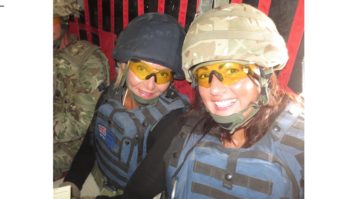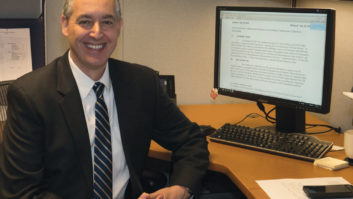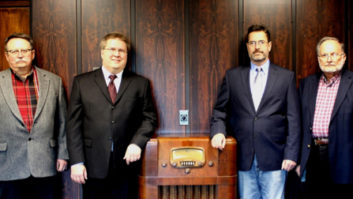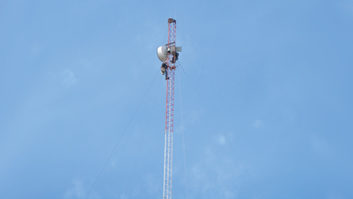Here and in coming days we sample sessions and themes of the Broadcast Engineering Conference of the spring NAB Show. David Ramsay will be presenting at the “Extreme Broadcasting — Providing Radio and Television Services in Conflict Zones” session, April 18, 2 p.m.
IF YOU GO
What: “The world’s largest electronic media show covering the creation, management and delivery of content across all platforms”
When: April 16–21
Where: Las Vegas Convention Center
Who: 103,000 attendees, 1,700+ exhibitors
How: www.nabshow.com
How Much: Conference Flex Pass $695. Various packages offered by registration type, with discounts for NAB members, government employees and students
When it comes to extreme broadcasting, few assignments can match the dangers of operating broadcast studios and transmitters in conflict zones, where armed people are actually fighting. Yet the British Forces Broadcasting Service does just that.
It provides on-the-ground radio and TV services to British troops serving around the world, including in war-torn regions such as Afghanistan and Iraq. BFBS is the broadcasting division of the Services Sound and Vision Corp. or SSVC, a not-for-profit charity employing civilians who work alongside the British military on the front line, “to be the preferred provider of entertainment and information to service personnel and their families worldwide.”
In doing these dangerous assignments, BFBS engineers and technicians, journalists and DJs — all of whom are civilians — put their lives on the line to boost morale of the U.K.’s deployed fighting forces. The risk is worth it, according to David Ramsay, SSVC’s general manager, Europe, Middle East and Africa, BFBS Technology.
“If you have not experienced the austere, uncomfortable and dangerous environment of Afghanistan or Iraq, it can be difficult to understand quite how important radio and TV services from back home are,” Ramsay said.

Ramsay awaits a helicopter ride in Afghanistan as a serviceman keeps watch. “The chance to lose yourself in a sporting event or film, or the chance to close your eyes and listen to music, news and very possibly a message or dedication from your friends or family back home, it is a great morale boost and the benefit psychologically of being able to detach yourself from your present surroundings and for a period of time be mentally elsewhere should not be underestimated.”
Ramsay will speak Monday April 18 during the Broadcast Engineering Conference, sharing his 20-plus years of field experience with the BFBS in a session titled “Extreme Broadcasting: Providing Radio and Television Services in Conflict Zones.”
“Hear how the sound of BFBS Radio drove the Iraqi army out of Basra, how BFBS built and installed nearly 100 TV and radio transmitters across Afghanistan and how BFBS turned a patch of barren desert into a multi-studio radio and TV complex, complete with infinity swimming pool,” states the convention’s online session description.
“Be aware: this presentation may contain bombs, bullets and dangerous levels of humor.”
PLUG-AND-PLAY
Speaking to Radio World, Ramsay was careful not to reveal what sound BFBS Radio used to liberate Basra. But he did have lots to say about BFBS’ work entertaining and informing British troops worldwide.
Started in 1943 in Algiers with service spreading throughout North Africa, “BFBS effectively provided the soundtrack for Field Marshall Montgomery’s Desert Rats to push Rommel’s Panzer Divisions out of Africa and start turning the tide in favor of an Allied victory,” said Ramsay.
“Since the end of the Second World War, BFBS has been an integral part of ‘Forces life,’ and wherever the British Forces were deployed across the globe, BFBS radio, and later TV services, would be on hand to provide entertainment and news, as well as that vital link with home.”
Today, BFBS operates radio studio complexes in the United Kingdom, Germany, Cyprus, Gibraltar, Canada, the Falkland Islands, Nepal and Brunei, as well as transmission services and satellite TV reception in many more countries. It provides 17 TV channels and more than 30 radio streams to troops serving abroad, as well as a U.K. national DAB radio service and 10 regional FM or digital radio services scattered across the country (www.bfbs.com). BFBS also provides the Armed Forces with its own TV channel, Forces TV (www.forces.tv), which concentrates on news stories and documentary and entertainment programming of specific interest to the forces community.

A view from an installation in Kabul in 2002. “At a look angle of 18 degrees, getting line of site to the satellite often meant mounting dishes at height and often on a roof,” Ramsay said. “Also it meant our offset dishes looked as though they were pointing down, which confused people.” In order to set up studios quickly, BFBS builds studios and communications systems into shipping containers in the U.K. These outfitted containers are sent to conflict zones as “plug and play” facilities; just connect and go.
Intriguingly, these in-theater feeds are not ported directly to local transmitters and antennas. Instead, “BFBS uses VSAT (satellite) links to bring all overseas radio audio streams back to the U.K., where they are multiplexed into our main satellite distribution transport streams,” Ramsay said. “This means that we can deploy small FM transmission and DVB-T TV transmission systems without the need for terrestrial links or complicated satellite reception equipment.”
BFBS Radio is transmitted in conflict zones via FM, AM, DAB digital radio, satellite distribution via settop boxes (DTH) and Internet streaming from BFBS’s website and mobile app.
“For TV we use satellite distribution to set top boxes (DTH), digital terrestrial transmission, cable TV distribution — analog and digital DVB-C, DVB-T, QAM and IP — streaming via Wi-Fi to personal electronic devices while aboard ship or at remote FOBs, streaming via Internet and leaky feeder distribution,” Ramsay said.
“When BFBS services are requested for a new deployment, we often don’t know what infrastructure is available on the ground or what local host nation permissions will be possible for terrestrial transmission, so we have to be flexible and agile as regarding radio and TV delivery.”
In areas without local studios — such as Sierra Leone, Libya or Ukraine, for example, or in Syria and Iraq if needed in support of any British coalition efforts advising local forces — BFBS uses satellite to downlink content to locally-based transmitters.

The studio complex under construction at Camp Bastion (known to American troops as Camp Leatherneck) in Helmand Province, Afghanistan. In the photo are the VSAT comms cabin and accommodation units. “There was over 10 kilometers of cable, audio, CAT-5, telephone, satellite, control laid around the site to two studios, two comms cabins, 14 accommodation units and a large office.” “ALMOST” ROUTINE
Radio World wondered what it feels like to work in that environment. Does danger feel immediate?
“Traveling by road convoy in the early days in Basra, Baghdad and Kabul were fairly hair-raising,” Ramsay said. “We were in white fleet unarmored vehicles, and the threat of IEDs [and] roadside bombs was very real; and we did come under fire from small arms on a couple of occasions. One technician was in a two-vehicle convoy in Kabul, luckily in an armored civilian vehicle, and the other vehicle in the convoy was targeted by a vehicle-borne IED; luckily nobody was badly injured.
“While we were based at the Contingency Operating Base by Basra Airport, we were so often rocketed that it almost became a routine daily occurrence,” he said. “When travelling to the Forward Operating Bases in Helmand Province, at the FOBs in which we were installing broadcast services you would hear small arms fire or explosions nearby, and occasionally the FOB would be targeted.
“You just have to trust the people you are with, and the safety protection and procedures that are in place; the British Military excel at this, we’ve never had anybody injured and we’ve been doing this an awful long time. And when things are going bang and whizzing about, it’s best not to take it too personally.”
The job can be dangerous but it’s not just about foxholes and being under fire. Ramsay said BFBS built a well-equipped multi-studio radio and TV complex/living compound with infinity swimming pool in Afghanistan. “In the end we had a very comfortable compound, and why not,” Ramsay quipped. “There is no reason to be uncomfortable if you don’t have to be.”







